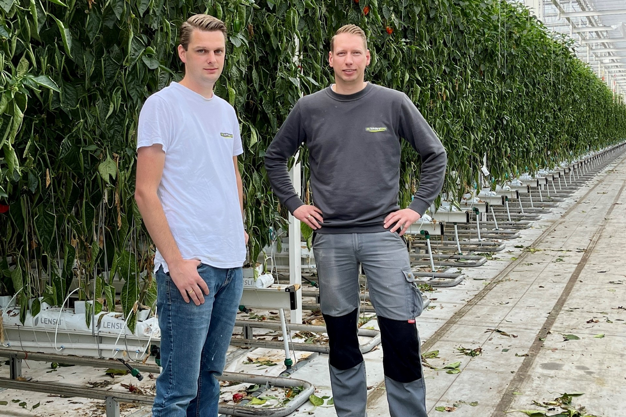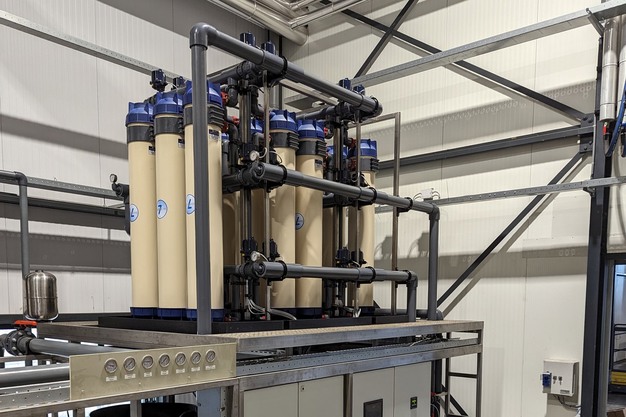More and more companies are considering installing an ultrafiltration system. While not the cheapest disinfection process, it does deliver excellent results. Last year, growers' cooperative Oxin Growers installed a Mienis Water installation at pepper farm De Tuindershoek. New mats, ultrafiltration, and an oxygen generator are giving good cultivation results this year; a positive turn of events after several years of concerns about plant diseases.
Pepper farm De Tuindershoek cultivates red and yellow peppers. The 14-hectare farm is split across two 7-hectare locations. Early this century, brothers André and Paul Kaashoek moved their company from the Zuid-Holland village of Moerkapelle to the province of Overijssel. They were succeeded by their sons, cousins Job and Jeroen. They sell their peppers through growers' cooperative Oxin Growers.
This season, many colleagues have visited the company, mainly to check out its switch from rock wool to an organic, circular mat. Not many of them know that the company has also radically changed course on the water side of things, installing an ultrafiltration system and an oxygen generator. There is a story behind this.
Root issues
Job and Jeroen talk about the root issues they encountered in 2022 in the second crop of red peppers, after having built a new greenhouse. They recall seeing the first problems with the crop a few months after the start of cultivation. "The overall picture was that the roots of many plants were dying. Of course, we had samples analyzed for Fusarium. The fungus was present both in affected and healthy plants, which was a bit of a mystery." The problem was so widespread they had to clear the entire crop. And because of the low-humidity climate in summer, replanting peppers was not an option. That's why they chose tomatoes for once.
After completing a comprehensive hygiene protocol during the crop change, they started a new crop of rock wool in 2023 with renewed courage. At the same time, they were conducting a small trial with a new organic mat. "In May-June, we started seeing root problems again," says Jeroen. "Not as bad as the year before, but growth was not optimal. We were able to finish growing, but it was clear that something had to be done." "One thing we did notice was that the plants in the trial on organic substrate remained healthy", adds Job.
Three measures
To start completely disease-free in 2024, the cousins decided to examine all factors surrounding the root environment. Their choice quickly fell on the new mat, but the entire water-side system was updated as well. "When we erected the new building, we had already bought a new UV disinfector, adding hydrogen peroxide to keep the pipes clean," says Job. This, however, was not enough. Oxin Growers has therefore invested in an ultrafiltration installation.
Ultrafiltration is based on a membrane with larger pores than reverse osmosis membranes, for example. While the membrane allows salts to pass through, it traps organic contamination, nematodes, fungi, bacteria, viruses, and other particles in the water. This technique allows you to clean larger amounts of water than other disinfection methods, which, in addition, leaves dead tissue in the water. Ultrafiltration filters this tissue out of the water, making it easier to control infections.
"Because of the increased capacity, ultrafiltration allows us to disinfect larger quantities of water. This means that, in addition to the drain water, we can now also treat the rainwater from the storage silos," they explain.

As a third measure, Oxin Growers has installed an oxygen generator to increase the oxygen level in the pipes. As De Tuindershoek does not keep a daily stock, the generator has been placed in the clean water silo.
Compact installation & automation
"Every system has its challenges," says Jochum Genuit of Mienis Water. "We built a compact, vertical ultrafiltration installation for Tuindershoek. This had to be installed in the tight spot where the UV disinfector used to be. We dismantled the old system and then installed the new system within two days.
Another challenge was the organic substrates, but because of our many experiences with this, the 'click' was there immediately. The automation of our system is what sets us apart and is also something we are very proud of. We work with multiple cleaning programs that we can switch on or off per customer so that we can deal with multiple different water qualities. The system maintains itself. The grower does not have to worry about it."
The first experiences with ultrafiltration are good. Samples taken on two occasions during cultivation were tested by the Eurofins Agro microbiological laboratory, in accordance with the OntsmetterCheck disinfectant check. Both times, the numbers of bacteria, fungi, and germs after disinfection were well below the guideline values. Which was a big relief. "We never want to experience a year like 2022 again," the cousins sigh.
Implementing three measures at once is a major intervention just to tackle one single issue. It's hard to tell what exactly has been the game changer. A lot of colleagues only look at the new mats, with only a few asking about ultrafiltration. But it's not as simple as that. "We believe that the combination of mats, ultrafiltration and oxygen is the key to success."
Ultrafiltration is an important step going forward, Job and Jeroen believe. Disinfecting the drain water alone does not provide sufficient assurance. Mienis Water, too, believes that it is important to treat all water flows to prevent disease problems.

Moreover, the growers wonder whether the combination of organic mats and UV disinfection is sufficiently effective. Will the growers who are currently considering switching to those mats use only UV for disinfection? Then it will be difficult for them to achieve the T10 values (transmission value).
"For us, that no longer is a consideration. We also find it unique that we can now operate a completely closed loop and also comply with the Water Framework Directive in the future," they conclude.
For more information:
Jochum Genuit
Mienis Waterzuivering
[email protected]
www.mienis-water.nl
